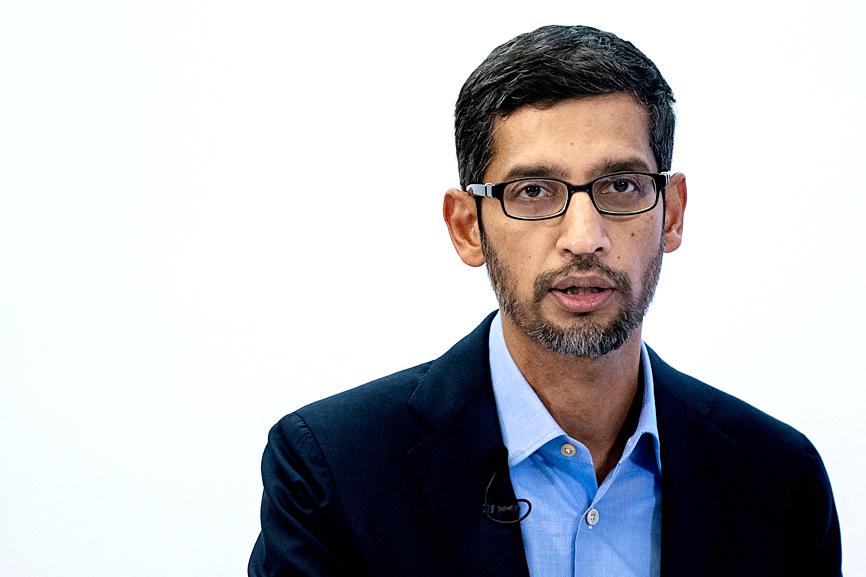While many other technology giants embrace the metaverse as the next frontier of growth, Alphabet Inc chief executive officer Sundar Pichai sees Google’s future in its oldest offering: Internet search.
“I feel fortunate our mission is timeless,” Pichai said in an interview in Singapore. “There’s more need to organize information than ever before.”
Earlier this month, Google parent Alphabet briefly crossed US$2 trillion in market value thanks to sales and profit growth during the COVID-19 pandemic.

Photo: AFP
When asked where the next US$1 trillion would come from, Pichai pointed to his company’s core service.
People will ask computers more questions with voice and “multimodal experiences,” he said. “Being able to adapt to all that and evolve search will continue to be the biggest opportunity.”
Since taking over Google in 2015, Pichai has pushed the company deeper into cloud computing and artificial intelligence (AI), while facing an increase in regulatory scrutiny.
In the interview, Pichai ticked off Google’s key growth businesses — cloud, the YouTube video service and its app store — and said AI investments were “underlying” each of them.
The India-born CEO also said he expects that more of Google’s products would be developed and tested in Asia first, before spreading across the globe.
Not in China, though.
After icing plans to bring search to China in 2018, following an employee uproar, Google has kept most of its services out of the nation.
“I don’t see that changing,” Pichai said.
However, he does not share other Silicon Valley executives’ dim view of China’s tech advances.
Pichai acknowledged that Google is “neck to neck” with Chinese companies in AI and quantum computing, but argued that the US and China have room to collaborate in areas such as climate change and AI safety.
Some of Google’s largest peers, such as Microsoft Corp and Facebook parent Meta Platforms Inc, have pitched their futures around the virtual worlds of the metaverse.
Google has taken several approaches at virtual and augmented reality products, with limited success.
Years ago, its first attempt, the Google Glass headgear, flopped.
Google recently placed these efforts in a new division reporting to Pichai, although he did not provide specifics about the strategy.
“I’ve always been excited about the future of immersive computing,” he said. “This doesn’t belong to any company. This is the evolution of the Internet.”
Promoters of the metaverse often talk about the potential to build in new technologies such as blockchain and cryptocurrencies.
Aside from some cloud partnerships, Google has largely steered clear of this part of the industry.
Pichai said he does not own any cryptocurrency.
“I wish I did,” he said. “I’ve dabbled in it, you know, in and out.”

RUN IT BACK: A succesful first project working with hyperscalers to design chips encouraged MediaTek to start a second project, aiming to hit stride in 2028 MediaTek Inc (聯發科), the world’s biggest smartphone chip supplier, yesterday said it is engaging a second hyperscaler to help design artificial intelligence (AI) accelerators used in data centers following a similar project expected to generate revenue streams soon. The first AI accelerator project is to bring in US$1 billion revenue next year and several billion US dollars more in 2027, MediaTek chief executive officer Rick Tsai (蔡力行) told a virtual investor conference yesterday. The second AI accelerator project is expected to contribute to revenue beginning in 2028, Tsai said. MediaTek yesterday raised its revenue forecast for the global AI accelerator used

Taiwan Semiconductor Manufacturing Co (TSMC, 台積電) has secured three construction permits for its plan to build a state-of-the-art A14 wafer fab in Taichung, and is likely to start construction soon, the Central Taiwan Science Park Bureau said yesterday. Speaking with CNA, Wang Chun-chieh (王俊傑), deputy director general of the science park bureau, said the world’s largest contract chipmaker has received three construction permits — one to build a fab to roll out sophisticated chips, another to build a central utility plant to provide water and electricity for the facility and the other to build three office buildings. With the three permits, TSMC

The DBS Foundation yesterday announced the launch of two flagship programs, “Silver Motion” and “Happier Caregiver, Healthier Seniors,” in partnership with CCILU Ltd, Hondao Senior Citizens’ Welfare Foundation and the Garden of Hope Foundation to help Taiwan face the challenges of a rapidly aging population. The foundation said it would invest S$4.91 million (US$3.8 million) over three years to foster inclusion and resilience in an aging society. “Aging may bring challenges, but it also brings opportunities. With many Asian markets rapidly becoming super-aged, the DBS Foundation is working with a regional ecosystem of like-minded partners across the private, public and people sectors

TEMPORARY TRUCE: China has made concessions to ease rare earth trade controls, among others, while Washington holds fire on a 100% tariff on all Chinese goods China is effectively suspending implementation of additional export controls on rare earth metals and terminating investigations targeting US companies in the semiconductor supply chain, the White House announced. The White House on Saturday issued a fact sheet outlining some details of the trade pact agreed to earlier in the week by US President Donald Trump and Chinese President Xi Jinping (習近平) that aimed to ease tensions between the world’s two largest economies. Under the deal, China is to issue general licenses valid for exports of rare earths, gallium, germanium, antimony and graphite “for the benefit of US end users and their suppliers